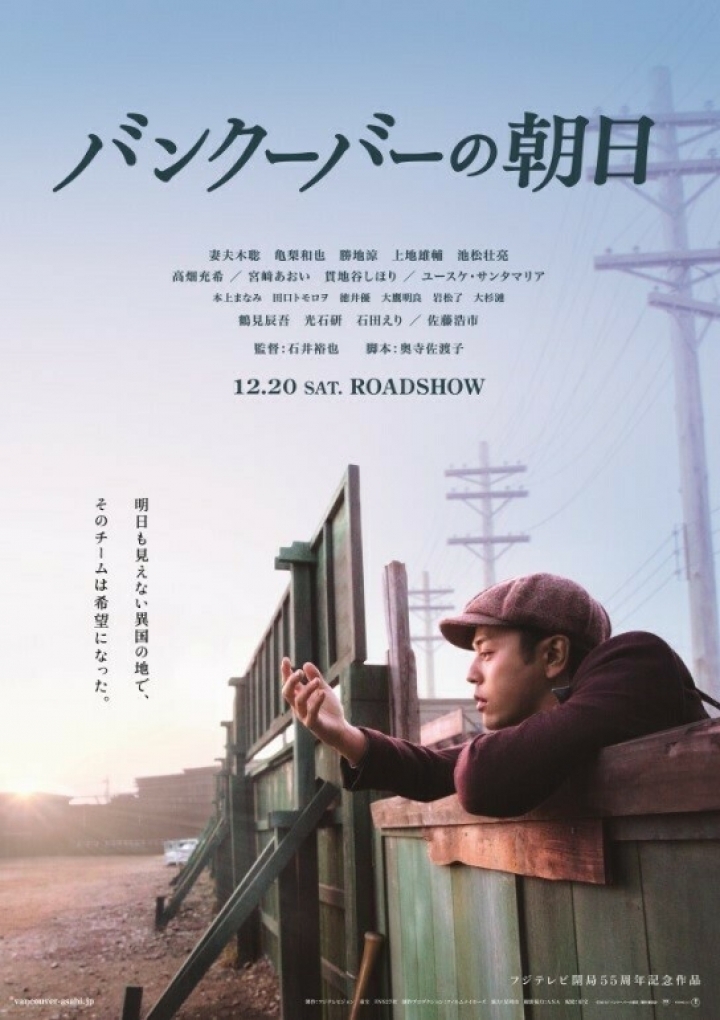THE VANCOUVER ASAHI
Original Title
バンクーバーの朝日
Bankuba no Asahi
-

-
Release : Dec-20-2014 Duration : 132min. ©︎2014 "The Vancouver Asahi" Film Partners
STAFF
Director : Yuya Ishii (The Great Passage) Screenplay : Satoko Okudera (Caf? Funiculi Funicula) Cinematography : Ryuto Kondo (Shoplifters) CAST
Satoshi Tsumabuki (The Asadas) Kazuya Kamenashi (POLICEMAN AND ME) Ryo Katsuji (Masquerade Hotel)
INTRODUCTION
This is a tale, based on a true story, of the Vancouver Asahi, a Japanese-Canadian baseball team, and the people who lived in the city’s ‘Japantown’ in the years prior to World War II.
Around the beginning of the 20th century, thousands of Japanese dreaming of riches crossed the Pacific Ocean to the west coast of Canada. Awaiting them there, however, was backbreaking manual labour and a life of poverty.
Since many had come only for the money and were willing to work cheap, Canadian workers saw them as stealing jobs. Unable to speak English, and in the face of racial discrimination often unwilling to learn, they made little attempt to assimilate and over the years their relationship with native-born Canadians hardened into one of mutual dislike.
It was a difficult time: these immigrants had no political rights, were limited in the types of work and business they could engage in, and faced a variety of other restrictions in their daily lives. In this environment, Japanese-Canadians in Vancouver’s ‘Japantown’ formed a baseball team. The ‘Asahi’, as they called themselves, were no match for the bigger and stronger white players on other teams, but gradually they evolved a style they called ‘brain ball’, relying on superlative fielding, bunts, and swift base-running. With this new style came victory, and they became a powerhouse in the amateur leagues of the West Coast.
Starting out as simply a baseball team, they soon came to represent the hopes and dreams of the restricted community from which they had come, and the combination of their small stature with their energy and sportsmanship won the approval of other Canadians as well. In time they became one of the most popular teams in the region. But then everything changed.
As baseball is a sport that bridges the gap between cultures, the tale of the Vancouver Asahi should have been one of disparate groups coming together. But with their ancestral homeland’s attack on Pearl Harbor in 1941, Japanese-Canadians were classified as enemy aliens and sent to internment camps. The Vancouver Asahi disbanded, and their story became a footnote to history.
Then, 62 years later in 2003, the Asahi came back into the spotlight when they were enshrined with Canada’s major league baseball stars in the Canadian Baseball Hall of Fame, the result of a growing sentiment among Canadians that their story should not be forgotten.
This film portrays Japanese-Canadians as overcoming the adversities of discrimination and ostracism to rediscover a zest for life. This is not done, however, to appeal to feelings of Japanese nationalism. The Japanese-Canadians in the movie speak ill of white Canadians, and are abusive of their women. Their growing ostracism is also described as a result of a single-minded dedication to work that opened them to accusations of weakening the position of other labourers, and against a clearly recognized backdrop of Japan’s military incursion into China. This is a film that tries to avoid becoming a simple morality tale of good versus evil, as Japan has its own history of prejudice as well.
Drawing on the ‘Asahi’ story of Japanese-Canadians in Vancouver, the film aspires to being a universal tale of a racial minority suffering discrimination and ostracism. These are things that have been part of the human condition since before history began, and will probably continue to haunt us as long as history continues, and The Vancouver Asahi looks at how we might go forward into the future based on a clear understanding of what has happened in the past.
Vancouver Asahi director Yuya Ishii’s The Great Passage won, among other prizes, the Award of the Japanese Academy for Best Picture in 2013, and nosed out Cannes Film Festival Jury Prize winner Like Father, Like Son to be nominated as Japan’s entry for Hollywood’s 2014 Academy Award for Best Foreign Film. Turning 31 in 2014, Ishii is a director for whom the Japanese film world has high hopes.
Scriptwriter Satoko Okudera leads a production staff of some of Japan’s top names.
In the principal role of Reggie/Reiji is Satoshi Tsumabuki, whose work with such directors as Yoji Yamada has made him one of Japan’s top stars. He is supported by a powerful cast of well-known faces.
STORY
A Tale of Miracles, a Tale of Glory
Based on the true story of a legendary pre-World War II baseball team in Canada
In the first years of the 20th century, thousands of Japanese sailed away in search of work in far-off Canada.
There, however, they found the harsh reality that confronts an immigrant: poverty and discrimination.
Against this background, 2nd-generation Japanese formed a baseball team?The Vancouver Asahi.
In a time of upheaval inimical to hopes and dreams, what was it they believed in? What was it they sought? The Vancouver Asahi comes back to life on the path they followed into legend.

